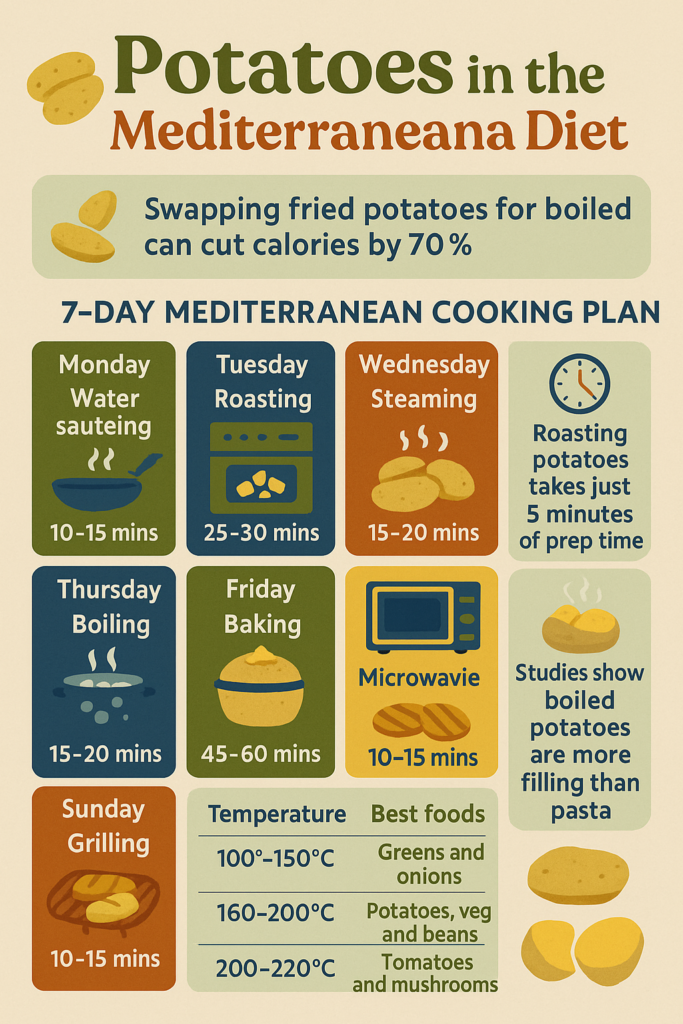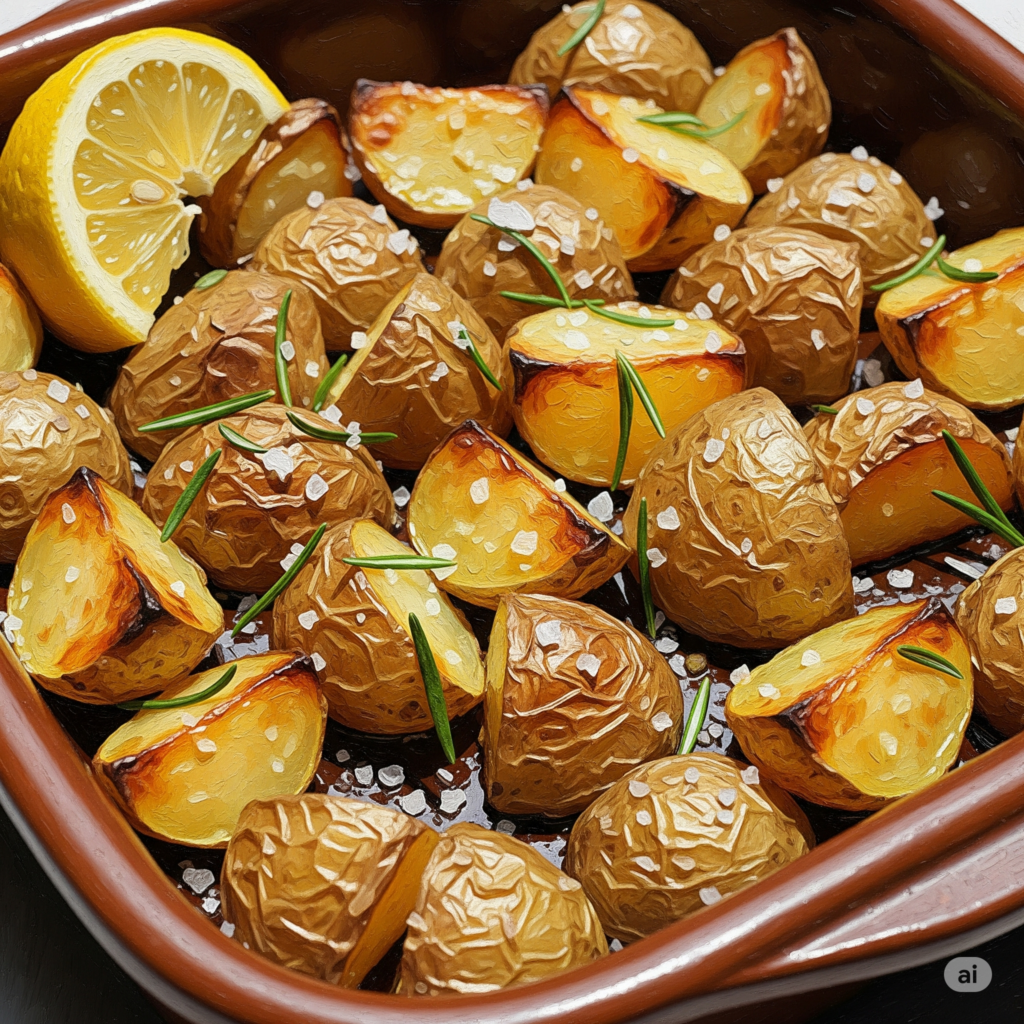Right, let’s talk spuds! Potatoes often get a bad rap, but they’re actually a Mediterranean diet staple. I’ll show you how to enjoy them the healthy, delicious way, just like they do in the Med. It’s all about preparation, not deprivation!
- Potatoes ARE part of the Mediterranean diet.
- Preparation is key: Ditch the deep fryer!
- Focus on boiling, roasting, and steaming.
- Small portions are perfectly fine.
- Get ready for some tasty potato recipes!
Quotables
- Swapping fried potatoes for boiled can cut calories by 70%.
- Roasting potatoes takes just 5 minutes of prep time.
- Studies show boiled potatoes are more filling than pasta.
Let’s talk about one of the most unfairly treated vegetables on the planet — the humble potato. For the last decade or so, it’s been given a dreadful reputation, banished by countless fad diets and labelled as an “unhealthy carb.” Avoid at all costs! Sound familiar? It’s been banished — quite unfairly, I might add. A 2019 study in Nutrients[1] actually highlighted the nutritional benefits of potatoes—their vitamin C, potassium, and fibre content, for starters—challenging that negative perception.
So, when people embrace the sensible, balanced Mediterranean way of eating, they understandably get a bit stuck. Can you eat potatoes? Are they “allowed”? It’s a question I hear all the time.
And I am delighted to tell you the answer is a resounding, “Absolutely, yes!” Not only can you eat potatoes, they’ve been a staple in Mediterranean kitchens for centuries — particularly in “cucina povera,” or “peasant cooking.” The very heart of this diet, you see.
The problem isn’t the potato itself. It’s what we tend to do to it. Right then, let’s clear up this confusion and put the potato back on the table where it belongs! Check out these tasty swaps to get started!
Why Are We So Confused About Potatoes?
The confusion is largely down to the rise of very low-carbohydrate diets, like Keto and Atkins. These plans forbid starchy vegetables like potatoes because they can raise blood sugar levels more quickly than, say, broccoli. True enough. But the Mediterranean diet isn’t a low-carb diet. It’s a balanced diet that includes healthy, complex carbohydrates as a key source of energy—just as the British Heart Foundation explains [2].
To exclude potatoes entirely is to misunderstand one of the core principles of Mediterranean eating: no food group is the enemy. Balance, portion size, and preparation are key. It’s a bit like saying you can’t have any cake, ever. A little bit of what you fancy does you good, eh? Everything in moderation.
It’s Not the Potato, It’s the Preparation
This, my friends, is the most important lesson you will ever learn about potatoes. A potato is not just a potato; its health impact changes dramatically depending on how you cook it.
Think about a typical deep-fried chip, cooked in processed vegetable oil and loaded with salt. Now compare that to a freshly dug potato, boiled or roasted with a drizzle of extra virgin olive oil and a sprinkle of rosemary. Two entirely different beasts, nutritionally speaking. That’s why understanding how the Mediterranean diet helps lower cholesterol is so vital.
The Mediterranean way celebrates the potato in its simpler forms:
- Boiled or Steamed: This method preserves nutrients beautifully and doesn’t add any extra fats.
- Roasted: Roasting with a little olive oil and herbs brings out a wonderful flavour – without the negative effects of deep-frying. Clever, right?
- In Stews and Soups: Potatoes are brilliant for adding substance and a creamy texture to hearty vegetable stews—like those found in these 15-minute skillet meals.
What you’ll rarely find in a traditional Mediterranean kitchen? Deep-fried potatoes or those smothered in creamy, high-fat sauces. Mind you, creamy salad dressings are a different matter. These can be made with healthy ingredients like yoghurt or tahini.
Golden Rule: Don’t Fear the Carbs
Starchy vegetables are a part of the Mediterranean diet, full stop. Eaten in moderation, and prepared in healthy ways, potatoes add valuable vitamins and minerals to your diet. Avoiding them completely is a mistake — especially when a balanced approach is key. Even seemingly “unhealthy” foods can become part of a balanced, nutritious diet when you learn how to use an air fryer effectively!
Methods & Evidence — An Observation Plan
Here’s a simple 7-day plan I’ve developed — to help you master oil-free Mediterranean cooking. Each day focuses on one technique, building your confidence gradually. Bit of a scaffolding approach, really.
- Day 1 (Monday): Practice water sautéing with onions and garlic. Aim for 10-15 minutes cooking time.
- Day 2 (Tuesday): Try roasting vegetables at 200°C for 25-35 minutes until golden.
- Day 3 (Wednesday): Steam green vegetables for 4-6 minutes, then finish with a squeeze of lemon.
- Day 4 (Thursday): Use your air fryer at 180°C for 12-18 minutes for crispy results.
- Day 5 (Friday): Braise lentils or beans for 30-45 minutes until tender.
- Day 6 (Saturday): Grill vegetables on high heat for 3-5 minutes per side.
- Day 7 (Sunday): Combine techniques for a complete oil-free Mediterranean feast! Go on, treat yourself.
Illustrative Teaching Table
| Technique | Temperature Range | Typical Time | Best Foods | Flavour Tip |
|---|---|---|---|---|
| Water Sauté | Medium heat | 10-15 mins | Onions, garlic | Add splash of wine |
| Roasting | 200-220°C | 25-35 mins | Root veg, peppers | Balsamic finish |
| Steaming | 100°C | 4-8 mins | Greens, broccoli | Lemon & herbs |
| Air Frying | 180-200°C | 12-18 mins | Potatoes, tofu | Spritz with citrus |
| Braising | 160-180°C | 30-60 mins | Beans, lentils | Fresh herbs at end |
| Grilling | High heat | 3-5 mins/side | Aubergine, mushrooms | Marinate first |
| Non-stick | Medium-low | 5-10 mins | Eggs, fish | Build aromatics |

My ‘Learned-It-the-Hard-Way’ Potato Moment
I’ll confess – I fell for the anti-potato hype myself for a while. Diligently swapped every potato for sweet potato, thinking it was vastly superior, “healthier.” Made so many mistakes like this when I first started out! I remember making this beautiful fish stew and feeling like something was missing. It lacked that… comforting, earthy substance. The kind that small, waxy boiled potatoes would’ve given it. I was following the “rules,” but missing out on flavour and tradition! The day I realised a small portion of simple boiled potatoes was not only fine but authentic? My cooking became so much more enjoyable—and a lot less rigid. It’s all about finding that balance that works for you.
Healthy Ways to Enjoy Potatoes, the Mediterranean Way
Ready to welcome the potato back into your kitchen? Here are some classic, delicious ideas—perfect for anyone figuring out how to eat the Mediterranean way:
- Lemon and Herb Roasted Potatoes: Chop potatoes into chunks, toss with olive oil, lemon juice, dried oregano, and a little salt and pepper. Roast until golden and crispy. Herbs are key to Mediterranean cooking—they add so much flavour without the extra calories!
- Simple Potato Salad: A world away from the mayo-laden version! Gently boil new potatoes until tender. While still warm, dress them with a simple vinaigrette of extra virgin olive oil, red wine vinegar, and finely chopped fresh parsley. Perfect heart-healthy lunch or side dish. A real crowd-pleaser.
- Hearty Bean and Potato Stew: Add diced potatoes to a simple stew of cannellini beans, tinned tomatoes, garlic, and onions. The starch from the potatoes will thicken the stew beautifully. Little tip? A slow cooker is a game-changer for this one. And tinned beans are a store cupboard hero, so stock up!
So, please, don’t fear the potato. It’s versatile, inexpensive, and oh-so-satisfying. It has a firm place in a true Mediterranean kitchen. Just like cheese or pasta, potatoes are perfectly acceptable in this way of eating. Enjoy them as they were intended — simply prepared, with healthy fats, and as part of a balanced and joyful meal. At the end of the day, the Mediterranean diet is about abundance and enjoying good food.
Sources
- British Heart Foundation – Mediterranean Diet Guidelines
- NHS Live Well – Healthy Eating Recommendations
- GOV.UK Food Standards Agency – Cooking Methods
Note: The cooking times and temperatures provided are educational examples only. Always adjust based on your specific equipment and ingredients.
FAQ: Your Potato Queries Answered
Are sweet potatoes better than regular potatoes on the Med diet?
Not necessarily! I used to think so, bless me. But both have their place. Regular potatoes are a traditional ingredient in many Mediterranean dishes, while sweet potatoes offer a different flavour profile and nutrient mix. Variety is the spice of life, as they say!
How can I make crispy potatoes without frying?
Ah, the crispy potato conundrum! Roasting or air frying with a little olive oil and herbs can give you that lovely crunch without the need for deep frying. Try exploring some new ingredients to add different dimensions to your roasties.
Can I eat potato skins on the Mediterranean diet?
Yes, indeed! Potato skins are packed with fibre, excellent for digestion. I often leave them on when roasting, for a bit of extra texture and those lovely nutrients. Just give them a good scrub beforehand.
What’s the best way to store potatoes?
Keep them in a cool, dark, and dry place—away from onions, ideally. This stops them sprouting and helps them last longer. A paper bag or a basket works a treat, but avoid plastic bags, they trap moisture. Learned that one the hard way!
Want to get started? Download my FREE guide to “My Top 5 Mediterranean Potato Recipes.” It includes simple, step-by-step instructions for the ideas mentioned above!
